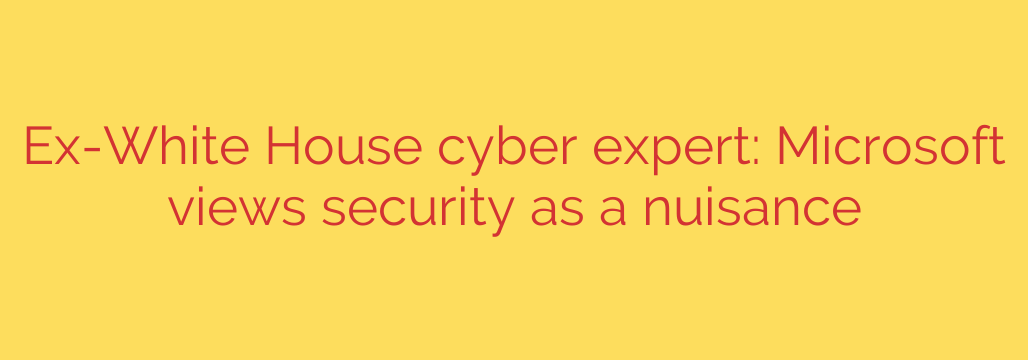
Is Microsoft Prioritizing Profits Over Security? A Stark Warning on Critical Vulnerabilities
In today’s digital landscape, Microsoft’s software and cloud services are not just products; they are the fundamental infrastructure for countless businesses, government agencies, and personal users worldwide. From the Windows operating system on your laptop to the Azure cloud services powering global corporations, their reach is immense. This dominance, however, brings with it a profound responsibility—a responsibility that, according to a damning assessment from a former top White House cyber official, the company may be failing to meet.
The core of the criticism is startling: Microsoft has fostered a corporate culture that views robust security not as a core feature, but as a “nuisance” and a “corporate tax” on its primary mission of developing and shipping new products. This perspective, it is argued, has led to a pattern of preventable security failures with global consequences.
A Culture That De-Prioritizes Security
When a company sees security measures as an inconvenient cost rather than an essential component of product integrity, dangerous gaps can emerge. The allegation is that Microsoft’s internal incentives are misaligned. Engineers and product managers are rewarded for innovation and speed, while security is often treated as an afterthought or a compliance checkbox.
This approach creates a significant risk. Instead of building security into the foundation of its products—a practice known as “secure by design”—the company is often left reacting to vulnerabilities after they have already been exploited. This reactive stance is simply not enough in an era of sophisticated, state-sponsored cyberattacks. The problem isn’t a lack of talent, but a lack of organizational will to make security a non-negotiable priority.
The Anatomy of a Critical Failure: The Storm-0558 Hack
This cultural issue is not just theoretical. It had devastating real-world consequences during the recent Chinese state-sponsored cyberattack, known as Storm-0558. In this breach, hackers successfully compromised the email accounts of high-level U.S. government officials, including Commerce Secretary Gina Raimondo.
The technical failure at the heart of the attack was breathtaking. According to reports, Microsoft failed to detect the theft of its own master cryptographic key, which essentially acted as a skeleton key to its cloud authentication system. This single stolen key allowed the attackers to forge access tokens and gain unfettered entry into supposedly secure cloud email accounts.
Such a lapse is not a minor oversight; it points to a systemic breakdown in fundamental security practices. A cryptographic key of this importance should be among the most heavily guarded assets in any technology company. Its loss, and the failure to even notice it was gone, suggests that security protocols were either inadequate or not being followed.
Why This Matters for Your Business and Personal Data
It’s easy to dismiss a government-level breach as a problem for Washington D.C., but the implications are far-reaching. The same systems and security philosophies that protect government data also protect your business’s critical information and your personal files on OneDrive.
If the systems underpinning global commerce and government are not secure by design, everyone is at risk. Small businesses using Microsoft 365, corporations relying on Azure for their infrastructure, and individuals using Windows are all part of the same ecosystem. A vulnerability that can be exploited by a nation-state can eventually be discovered and used by cybercriminals targeting smaller, more vulnerable targets.
The call to action is for a fundamental shift within Microsoft’s corporate DNA. It’s a demand for the company to treat security with the same seriousness as it treats feature development. This isn’t just about patching bugs faster; it’s about a top-down cultural change where security is woven into every stage of the product lifecycle.
Actionable Security Tips to Protect Yourself
While we must hold major technology providers accountable, users are not powerless. It is crucial to take proactive steps to secure your own corner of the digital world.
- Enable Multi-Factor Authentication (MFA): This is the single most effective step you can take. Even if a hacker steals your password, MFA prevents them from accessing your account without your phone or other secondary device.
- Implement the Principle of Least Privilege: For businesses, ensure that employees only have access to the data and systems they absolutely need to do their jobs. This limits the potential damage if an account is compromised.
- Keep All Systems Updated: Do not ignore those update notifications. Patches often contain critical security fixes for newly discovered vulnerabilities. Automate updates whenever possible.
- Review and Audit Security Logs: For businesses on Microsoft 365 or Azure, regularly review sign-in and audit logs for suspicious activity, such as logins from unusual locations or impossible travel scenarios.
- Educate and Train Your Team: The human element is often the weakest link. Regular training on how to spot phishing emails and other social engineering tactics can prevent a majority of intrusion attempts.
Ultimately, the security of our digital infrastructure is a shared responsibility. While corporations like Microsoft must lead the way by building more resilient and secure products from the ground up, users must remain vigilant. The digital world runs on trust, and it is imperative that this trust is well-placed and consistently verified.
Source: https://go.theregister.com/feed/www.theregister.com/2025/08/08/exwhite_house_cyber_and_counterterrorism/








